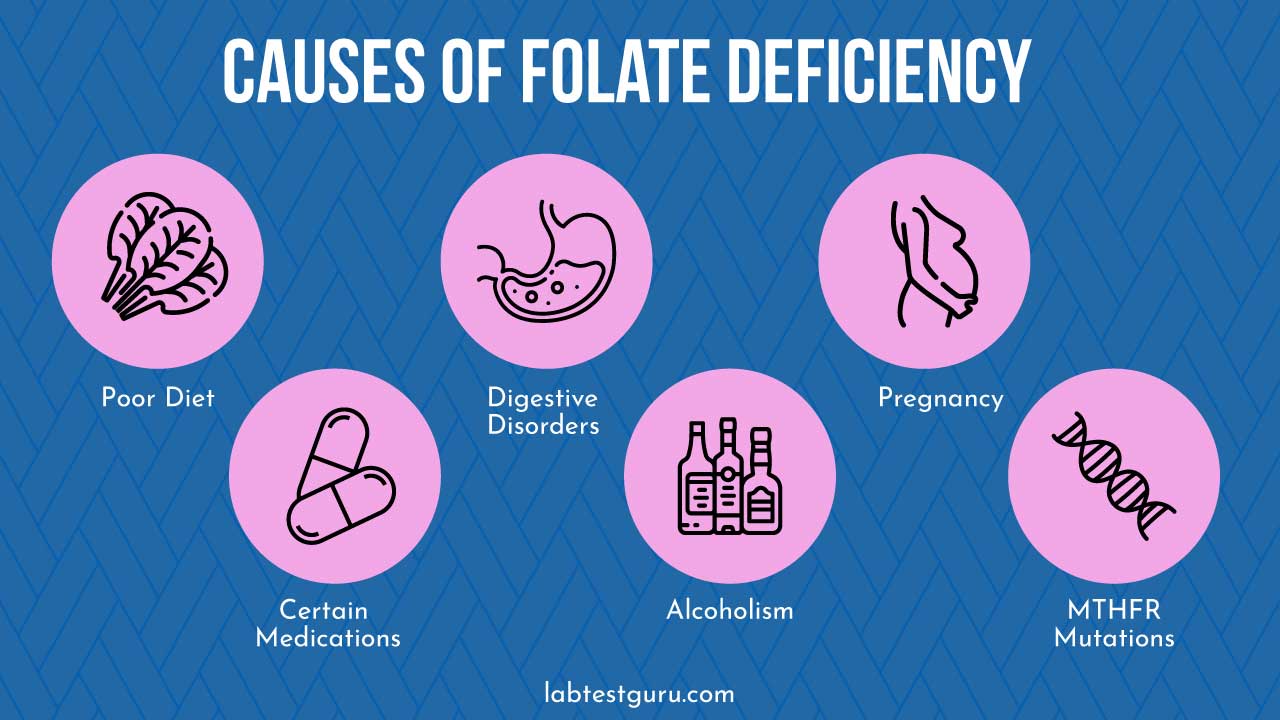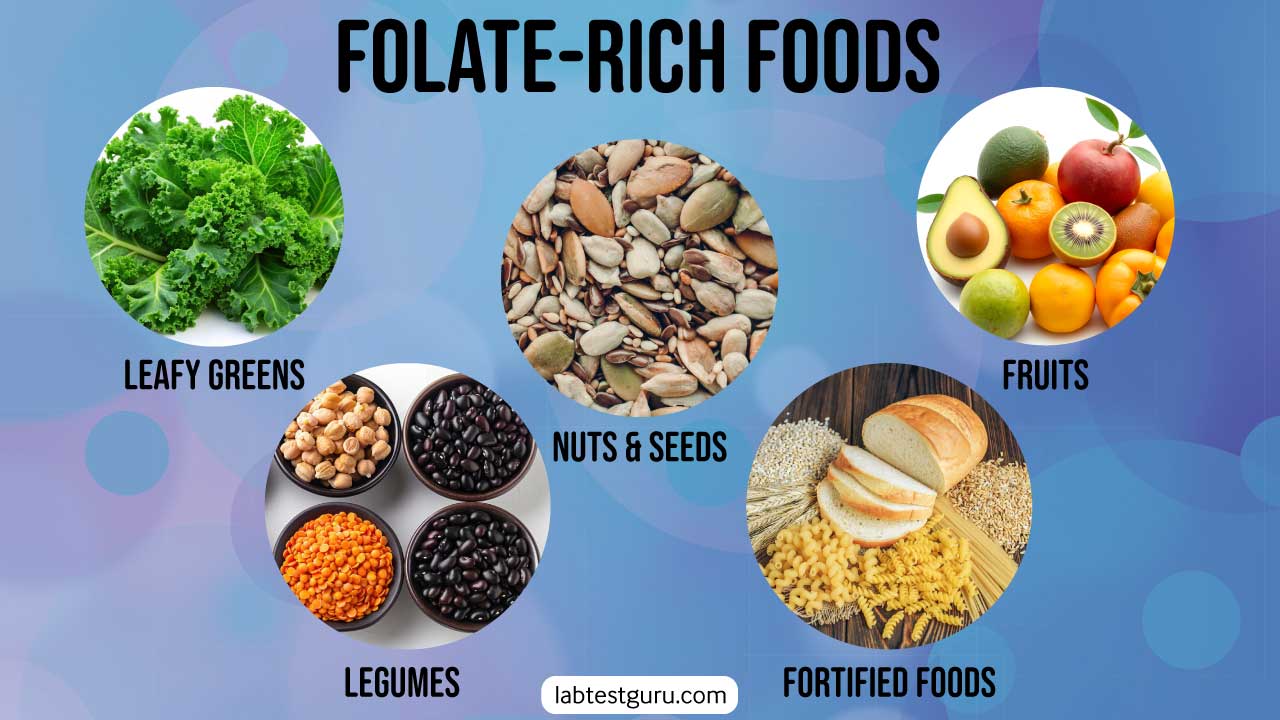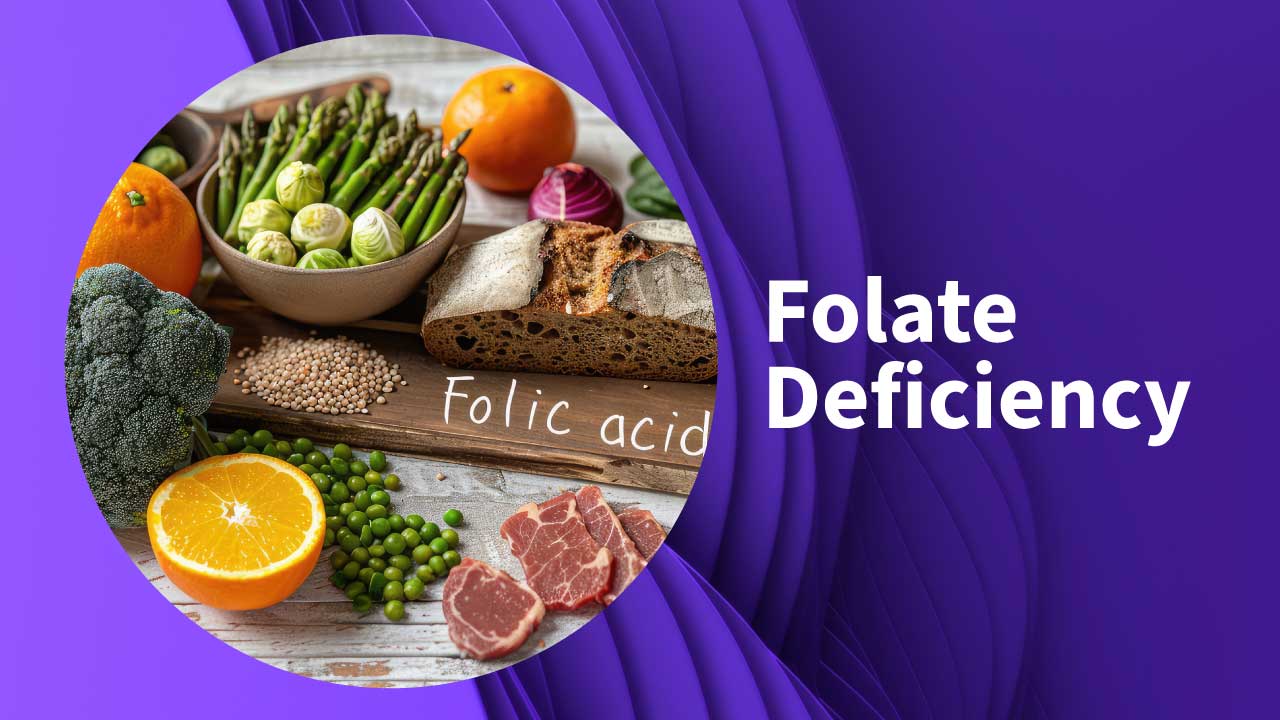Why Folate Matters More Than You Think
Folate, also known as vitamin B9, is such an essential component in our bodies. It plays a crucial role in DNA synthesis, cell growth, and red blood cell formation. Without enough folate, our bodies can’t function properly, leading to fatigue, anemia, and even complications in pregnancy. While it’s often overshadowed by other nutrients, folate is vital for our health—yet many people don’t get enough of it.
In this article, we’ll break down folate deficiency in a way that’s easy to understand, what are common folate deficiency symptoms and explore who’s most at risk. If you’ve been feeling tired, foggy-headed, or just not yourself, folate might be the missing piece of the puzzle.
Folate vs. Folic Acid: What’s the Difference?
Many people use these terms interchangeably, but they’re not quite the same.
- Folate is the natural form of vitamin B9 found in leafy greens, citrus fruits, nuts, and legumes.
- Folic acid is the synthetic version, commonly added to fortified foods (like bread and cereals) and found in supplements.
The key difference? Your body absorbs folate more efficiently from food, while folic acid needs to be converted in the liver before it can be used. Some people have a genetic variation that makes this conversion process less effective, putting them at a higher risk of deficiency.
What Causes Folate Deficiency?

Folate deficiency isn’t just about not eating enough greens (though that’s a big factor!). Several things can contribute to low folate levels.
- Poor Diet: This is the most common cause of folate deficiency. If you’re not eating enough fruits, vegetables, or fortified grains, you’re likely not getting enough folate.
- Digestive Disorders: Conditions like celiac disease, Crohn’s disease, or chronic diarrhea can interfere with folate absorption.
- Pregnancy & Breastfeeding: The body needs extra folate to support a growing baby and milk production, making pregnant and lactating women more vulnerable.
- Certain Medications: Some drugs, like anticonvulsants and cancer treatments, interfere with folate metabolism.
- Alcoholism & Liver Disease: Heavy alcohol consumption can block folate absorption and increase its excretion from the body.
- Genetic Factors: Some individuals have genetic mutations (such as MTHFR mutations) that make it difficult for their bodies to process folic acid efficiently.
Folate Deficiency Signs & Symptoms
Folate deficiency can creep up on you. At first, folate deficiency symptoms may be subtle, but they can become serious if left untreated. These folate deficiency symptoms overlap with other vitamin B deficiencies, thus getting an accurate diagnosis is important to receive the right treatment.
Common Folate Deficiency Symptoms
- Fatigue & Weakness: These are one of the earliest and most frequent folate deficiency symptoms. Folate is essential for energy production, and low levels can leave you feeling drained.
- Headaches: Poor oxygen delivery to the brain can trigger headaches.
- Irritability & Brain Fog: Since folate helps produce neurotransmitters, a deficiency can lead to mood swings and trouble concentrating.
- Pale Skin: Folate deficiency can lead to anemia, making your skin look paler than usual.
- Shortness of Breath: A lack of oxygen-rich red blood cells can make it harder to breathe, especially during physical activity.
More Severe Folate Deficiency Symptoms
- Glossitis (inflamed tongue): The tongue may become smooth, red, and painful due to folate deficiency.
- Mouth sores: Sores or ulcers may develop on the lips or inside the mouth.
- Digestive Issues: Folate deficiency may lead to diarrhea and other stomach problems.
- Numbness and tingling Sensations in Hands & Feet: This can indicate nerve damage in severe cases.
- Depression & Confusion: Since folate is crucial for brain health, prolonged deficiency can lead to mood disorders.
Folate Deficiency in Pregnancy: A Serious Concern
One of the biggest dangers of folate deficiency is its impact on pregnancy. Low folate levels increase the risk of neural tube defects (NTDs) in babies.
Folate plays a critical role in DNA synthesis and cell division, which are essential processes during early fetal development. When a pregnant woman has inadequate folate levels, these crucial processes can be disrupted, increasing the risk of malformations in the developing neural tube.
NTDs occur during early fetal development (within the first few weeks) when the neural tube, which forms the brain and spinal cord, fails to close properly. This can lead to a range of serious complications, including:
These include:
- Spina Bifida: An incomplete closure of the spinal column, leading to nerve damage, paralysis and other disabilities.
- Anencephaly: A severe brain defect that is often fatal as a significant portion of the brain and skull did not develop.
Because these defects develop in the first few weeks of pregnancy—before many women even know they’re pregnant—health experts recommend that all women of childbearing age take a folic acid supplement (at least 400 mcg daily).
Testing for Folate Deficiency
If you suspect you might be deficient, a simple blood test can confirm it. The most common tests include:
- Serum Folate Test: Measures the amount of folate in your blood, but can be influenced by recent dietary intake.
- Red Blood Cell (RBC) Folate Test: Gives a more accurate picture of long-term folate levels.
- Complete Blood Count (CBC): Checks for anemia and abnormal red blood cells.
- Vitamin B12 Test: Since B12 and folate deficiencies have similar symptoms, this test helps rule out B12 deficiency.
- Homocysteine and Methylmalonic Acid (MMA) Tests: High levels of homocysteine can indicate folate deficiency, while MMA tests help differentiate between folate and B12 deficiency.
How to Treat and Prevent Folate Deficiency
The good news? Folate deficiency is easy to fix with the right approach!
Eat More Folate-Rich Foods

- Leafy greens: Spinach, kale, romaine lettuce
- Fruits: Oranges, papayas, avocados
- Legumes: Lentils, chickpeas, black beans
- Nuts & Seeds: Sunflower seeds, peanuts
- Fortified Foods: Breakfast cereals, bread, pasta
Take a Supplement If Needed
If you’re at high risk (pregnant, breastfeeding, or have absorption issues), your doctor may recommend a daily folic acid supplement. Typical doses range from 400–1000 mcg, depending on your needs.
Monitor Your Health
If you have ongoing folate deficiency symptoms, it’s important to follow up with blood tests to ensure your folate levels are where they should be.
Final Thoughts
Folate deficiency is more common than you might think, but the good news is that it’s easy to prevent and treat. By eating a balanced diet, recognizing folate deficiency symptoms early, and taking supplements when needed, you can keep your body functioning at its best.
If you’re unsure about your folate levels or if what you have is folate deficiency symptoms, a simple at-home folate test kit can provide answers quickly. Check out our recommended test kits at LabTestGuru.com to take control of your health today!
Disclaimer: This information is for general knowledge and informational purposes only and does not constitute medical advice. Always consult with a qualified healthcare professional for any health concerns or before making any decisions related to your health.
References
- Zhao G, Ford ES, Li C, Greenlund KJ, Croft JB, Balluz LS. Use of folic acid and vitamin supplementation among adults with depression and anxiety: a cross-sectional, population-based survey. Nutr J. 2011 Sep 30;10:102. doi: 10.1186/1475-2891-10-102. PMID: 21962075; PMCID: PMC3200167.
- Khan KM, Jialal I. Folic Acid Deficiency. [Updated 2023 Jun 26]. In: StatPearls [Internet]. Treasure Island (FL): StatPearls Publishing; 2024 Jan-.
- Viswanathan M, Urrutia RP, Hudson KN, Middleton JC, Kahwati LC. Folic Acid Supplementation to Prevent Neural Tube Defects: Updated Evidence Report and Systematic Review for the US Preventive Services Task Force. JAMA. 2023 Aug 1;330(5):460-466. doi: 10.1001/jama.2023.9864. PMID: 37526714.

